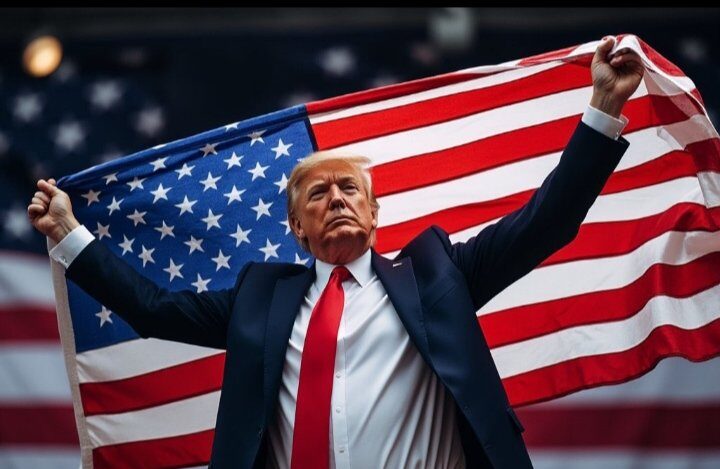
In an unexpected move that has sent shockwaves through both the political and tech worlds, former President Donald Trump has appointed billionaire entrepreneur Elon Musk and biotech mogul Vivek Ramaswamy to spearhead a new initiative aimed at reforming government efficiency in the United States. The initiative, dubbed “DOGE” — an acronym for “Digital Optimization for Government Efficiency” — has raised eyebrows due to its unconventional approach, celebrity leadership, and controversial ties to the cryptocurrency Dogecoin. But is it a genius plan to streamline government or just a high-profile publicity stunt?
The Dream Team: Musk and Ramaswamy
Trump’s decision to bring in two of the most well-known disruptors in business and technology has sparked widespread debate. Elon Musk, the CEO of Tesla and SpaceX, has become synonymous with radical innovation and space exploration. Meanwhile, Vivek Ramaswamy, a hedge fund manager and outspoken advocate for free-market capitalism, has garnered attention for his political aspirations and his critiques of corporate America’s ties to “woke” culture. Together, they make for an intriguing and unconventional pair.
Musk has long been an advocate for decentralization, cryptocurrency, and the power of market-driven innovation. Ramaswamy, who has positioned himself as a champion of anti-establishment ideals, is a vocal proponent of reducing government intervention in the private sector. The two are expected to leverage their combined expertise in technology, business, and regulatory reform to address inefficiencies within the federal government.
However, the “DOGE” initiative, named after the popular cryptocurrency Dogecoin (which Musk has frequently promoted), has already raised a host of questions. Many critics have speculated that the choice of Dogecoin as a central theme of the initiative is more about branding and publicity than practical governance.
What Is the DOGE Initiative?
The “DOGE” initiative aims to streamline and modernize the U.S. federal government through the adoption of cutting-edge technologies, including blockchain, artificial intelligence, and digital currency. The plan calls for overhauling bureaucratic processes, reducing government waste, and utilizing decentralized finance (DeFi) tools to increase transparency and accountability.
While the details remain vague, the core concept revolves around using blockchain to create an immutable, transparent ledger of government transactions, making it easier to track spending and reduce corruption. Dogecoin, often criticized for being a meme coin with little inherent value, is touted by Musk as a potential vehicle for streamlining government operations and creating more efficient financial systems.
This proposal has received both support and criticism. On one hand, proponents argue that the use of blockchain technology and cryptocurrency could dramatically reduce fraud, lower transaction costs, and bring more transparency to government operations. By decentralizing financial management, Musk and Ramaswamy believe they can cut through the inefficiencies of government bureaucracy, which is often bogged down by outdated infrastructure and complex regulations.
On the other hand, critics point out the inherent risks of linking government efficiency to a volatile and speculative digital currency like Dogecoin. While blockchain technology holds promise, its implementation in government systems is still largely untested, and the use of a meme-based cryptocurrency raises serious questions about the seriousness and credibility of the initiative.
Is This a Strategic Move or a Marketing Gimmick?
Trump’s decision to appoint Musk and Ramaswamy is undoubtedly strategic. By aligning himself with two high-profile business figures, he is positioning himself as a champion of innovation and reform. Musk’s global influence and Ramaswamy’s populist appeal could give Trump a fresh wave of credibility among tech-savvy voters and business-oriented conservatives.
However, some skeptics argue that the “DOGE” initiative is less about real reform and more about generating media buzz. Musk’s frequent tweets about Dogecoin, combined with Trump’s history of using controversial figures for attention, have led many to suspect that the announcement is more about staying in the headlines than actually improving government processes. The “DOGE” initiative could easily be viewed as a clever PR stunt designed to keep both Musk and Trump relevant in the public eye, while offering little substance in terms of practical solutions for government inefficiency.
Cryptocurrency and Government: A Risky Proposition
The idea of using cryptocurrency to reform government efficiency is not entirely new. In fact, several countries, including Estonia, have experimented with blockchain-based governance systems. However, the use of Dogecoin, a currency that was originally created as a joke, raises serious questions about whether the U.S. government is ready to embrace such a volatile and speculative asset in its financial systems.
Moreover, critics argue that while blockchain could reduce some inefficiencies, it could also create new risks, such as cybersecurity vulnerabilities, regulatory challenges, and the potential for increased centralization under the guise of decentralization. The complexities of implementing a nationwide blockchain-based government system could lead to unforeseen consequences, including the possibility of exacerbating existing inequalities or opening the door to new forms of manipulation.
Conclusion: A Visionary Strategy or a Dangerous Gamble?
The “DOGE” initiative is a bold proposal that has the potential to transform government efficiency by introducing new technologies like blockchain and digital currencies. However, it is not without its risks and uncertainties. The choice to tie the initiative to Dogecoin, a cryptocurrency often associated with memes and market speculation, casts doubt on the seriousness of the project and its long-term viability.
Trump, Musk, and Ramaswamy are undoubtedly playing a high-stakes game, combining technology, politics, and cryptocurrency in a way that could either revolutionize governance or backfire spectacularly. Only time will tell whether the “DOGE” initiative is a visionary strategy for reform or just another marketing gimmick in the ever-evolving world of American politics.






